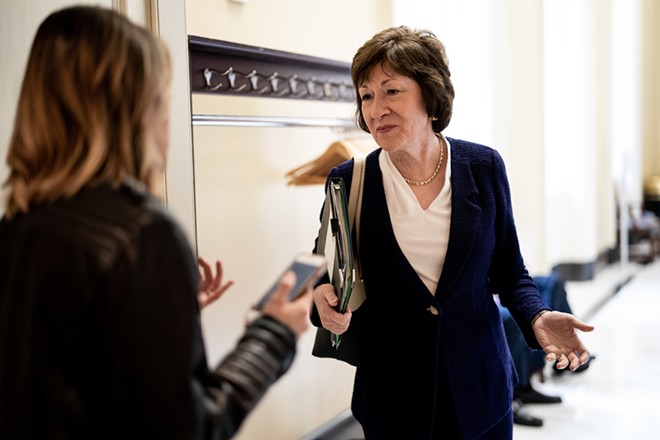
Erin Schaff/The New York Times
Sen. Susan Collins (R-Maine) talks to a reporter en route to a policy luncheon on Capitol Hill in Washington, Oct. 22, 2019. In a radio interview broadcast on Dec. 30, Collins specifically referenced Sen. Majority Leader Mitch McConnell in criticizing Senate colleagues who “prejudge the evidence” in impeachment proceedings against the president.
The New York Times Company
WASHINGTON — Sen. Susan Collins, R-Maine, criticized some of her Senate colleagues, including the majority leader, for appearing to “prejudge the evidence” in impeachment proceedings against President Donald Trump, becoming the second Republican senator to question Sen. Mitch McConnell’s pledge to coordinate with the White House.
Impeachment rules require a simple majority vote, meaning McConnell, R-Ky., can afford to lose only four members of his conference if he is to set the parameters of a trial. Sen. Lisa Murkowski, R-Alaska, another moderate with an independent streak, said last week that she was “disturbed” by McConnell’s promise to work with the White House counsel to set the terms of the trial.
Both Murkowski and Collins also offered noncommittal positions on calling witnesses to an impeachment trial, which Democrats have pushed and McConnell has resisted.
“It is inappropriate, in my judgment, for senators on either side of the aisle to prejudge the evidence before they have heard what is presented to us, because each of us will take an oath, an oath that I take very seriously to render impartial justice,” Collins said in an interview with Maine Public Radio that was broadcast Monday. “That’s what it says, impartial justice.”
She specifically referenced remarks from McConnell, that he would take his cues from the White House, and from Sen. Elizabeth Warren, D-Mass., a contender for the Democratic presidential nomination, who openly supported the impeachment of the president.
“There are senators on both sides of the aisle, who, to me, are not giving the appearance of and the reality of judging this in an impartial way,” she said, a sentiment she echoed in a separate interview with News Center Maine, a local television station.
With Collins and Murkowski doubting their leaders’ approach, scrutiny will fall on independent-minded Republicans like Sen. Mitt Romney of Utah and retiring Republicans such as Sen. Lamar Alexander of Tennessee, who could force Republican and Democratic leaders to work out the terms of a trial the way they did in 1999 with the impeachment trial of President Bill Clinton.
An aide to McConnell on Tuesday pointed to instances during the Clinton impeachment trial in which Clinton and his lawyers were in communication with Senate Democrats over proceedings, suggesting the current leader’s pledge to coordinate was nothing new and nothing to apologize for.

